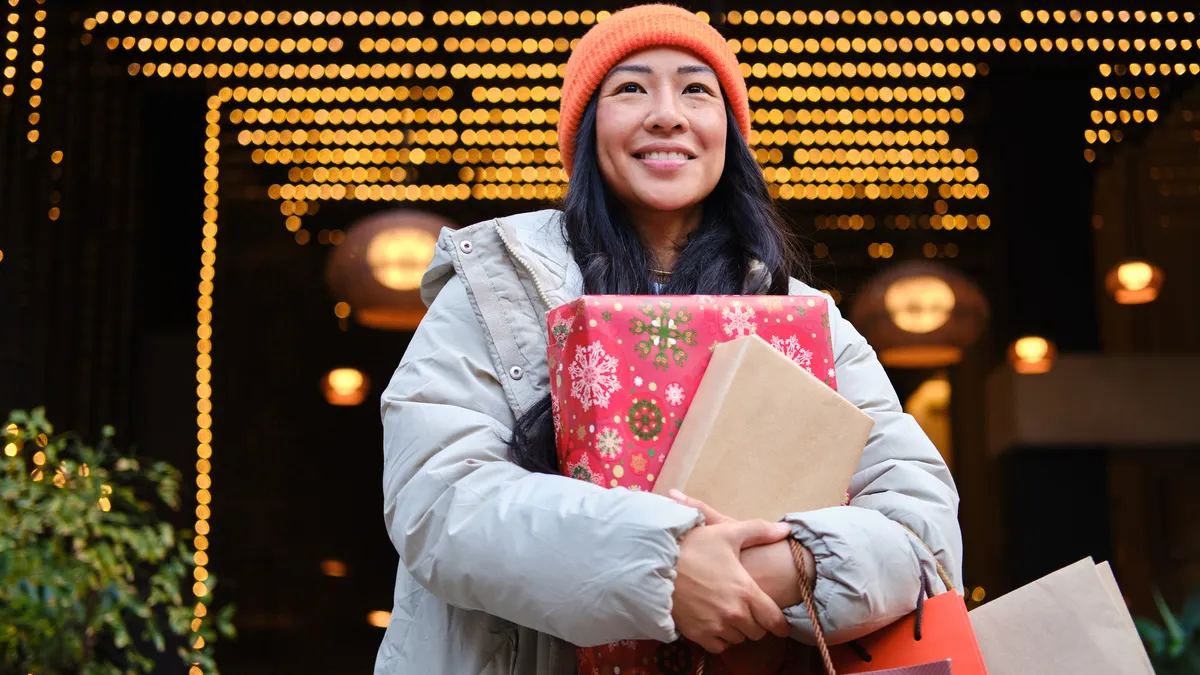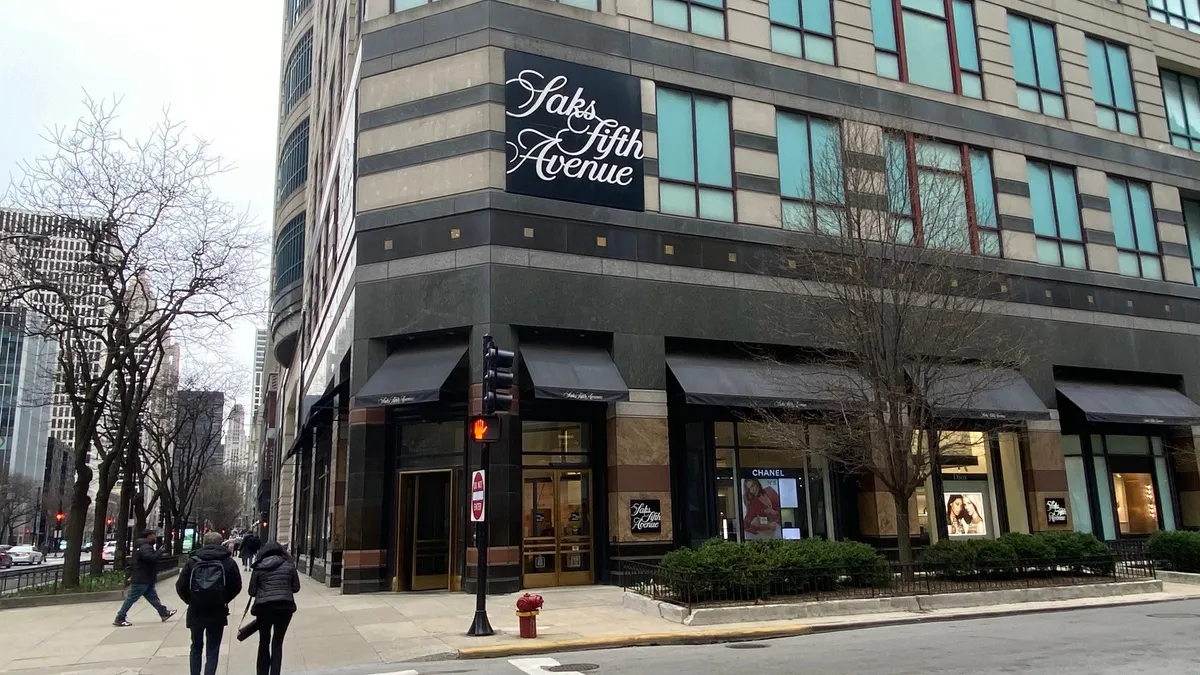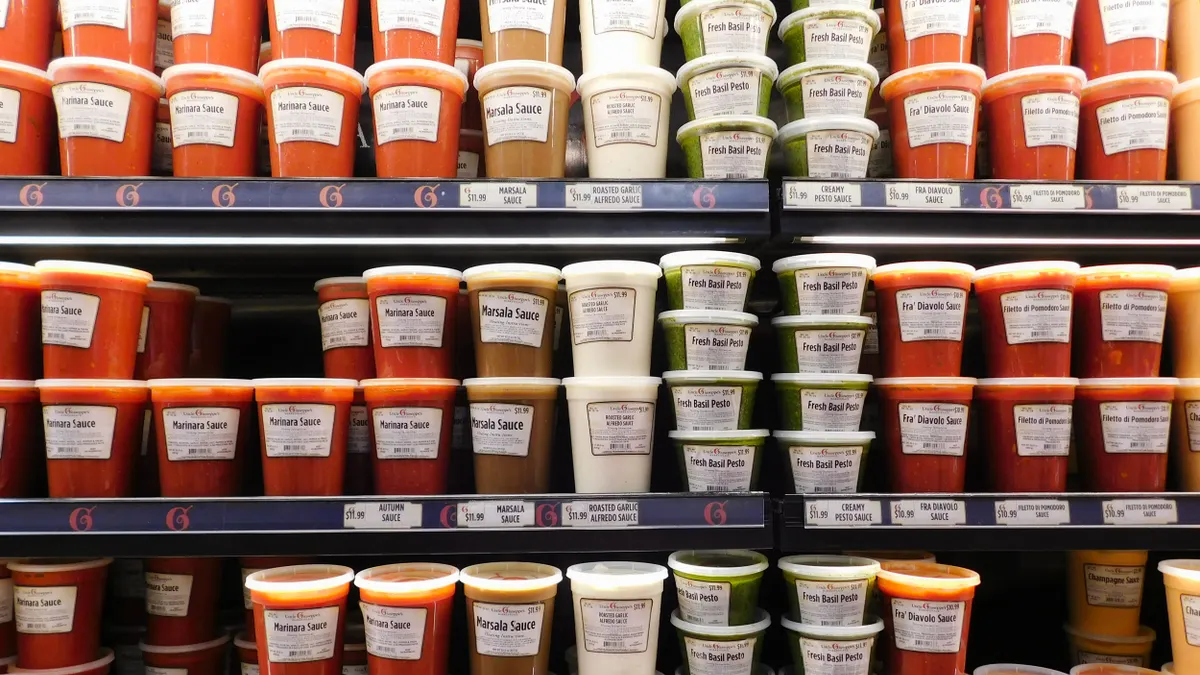In the past several weeks, retailers haven't seen much of their customers.
Retailers and consumers alike remain focused on cutting short the impact of COVID-19, the disease that has swept the globe. At the moment in most locales, when people do venture out it's only for essential items from the few stores that are open, and these days their faces are often covered. Otherwise, shopping is accomplished online.
The extreme lockdown of today will be eased at some point, though it's not yet clear when. Perhaps even more uncertain is what the frame of mind of their erstwhile customers will be.
"The questions are, first, how long will the virus actually be here? And then, how long will it be in people's psyches?" Simeon Siegel, managing director at BMO Capital Markets, told Retail Dive in an interview. "Right now it's very unclear how long this impact will be — not only because we don't know the duration of the virus but because there's a latent fear that's emerging as well. The longer the impact, the more lingering the fear and the more evolution there will be of consumer processes."
Changes in attitude
Most stores in the U.S. are closed now. Those stores that are open are limiting their hours and how many customers go in at a time. While e-commerce has had its own struggles with fulfillment, shopping has definitely shifted online: From March 23 to March 30, e-commerce marketplaces saw a 14% increase in volume, according to data from the Forter Global Merchant Network.
That stands to continue, and, in fact, the pandemic is likely to stoke other existing trends, according to BMO's Siegel. "It would seem that the coronavirus is accelerating the structural changes we've been seeing across retail and society for the last decade — toward online interaction, toward e-commerce and away from brick and mortar, toward direct-to-consumer away from department stores," he said. "On the one hand, social media has essentially been prepping the world for 'social distancing.' On the other, humans aren't built to not interact."
"Right now, there's fear as customers move through a store."

Daniel Binder
Partner, Columbus Consulting
Whether and how many customers return after the pandemic eases also depends on what they take away from their imposed isolation, according to Thomai Serdari, a professor of luxury marketing and branding at New York University's Stern School of Business. There's likely to be pent-up demand, but possibly tempered by a new appreciation for consuming less, especially as a recession bears down, she said.
"I think that a lot of people are going to realize that they don't need as much — we have missed an entire month already that we're never going to get back," she told Retail Dive in an interview. "And people are pressured financially because they're losing their jobs and preparing for a recession. On the other hand, the social distancing and deprivation is really intense — perhaps the restaurants and bars will be the first to recover. We will all be craving a bit of entertainment, which is what shopping has always been."
What is unlikely to subside is the current penchant for cleanliness, experts say. A whopping 87% of U.S. shoppers prefer to shop in stores with "touchless or robust self-checkout options," for example, while more than two-thirds are using some form of self-checkout, according to new research from weighing solutions firm Shekel.
"Right now, there's fear as customers move through a store," said Daniel Binder, a partner at Columbus Consulting, who managed Asia-based supply chains during the SARS and H1N1 pandemics. "What retailers will have to figure out is how to bring a sense of structure and calm."
That includes making it obvious how clean a store is, he said. "There will be hand sanitizer everywhere you go, payment options that don't involve touchscreens or cash. Just not having to touch something that is also being touched by multiple people. This will pass, there will be a return to normal, and the DNA of the brand is still going to be critically important."
And that also includes stores, he said. "The millennial consumer, they do demand the in-store experience," he said in an interview, adding that e-commerce will continue to be reserved for buying essentials. "They want the experience to be embracing, and the brand's responsibility is to build a level of trust, and the store experience helps anchor that."
"[T]he deeper the economic impact is and the longer everybody is cooped up; the more of a shock there will be to the system and it may take longer for the consumer to come back."

Chip Bergh
CEO, Levi's
That is playing out already in China, according to Levi’s CEO Chip Bergh. In January, the denim retailer was forced to shut most locations in China, including its new experiential store in Wuhan. As they slowly reopen now, the company is taking lessons from Chinese consumers, although the economic impact on U.S. consumers who may experience more longer-lasting job losses, may preclude that to a great extent, he said on a conference call with analysts Tuesday, per a Seeking Alpha transcript.
Still, Levi’s will endure, as it has through many tragedies throughout its 167-year history, he said. “I would say the deeper the economic impact is and the longer everybody is cooped up; the more of a shock there will be to the system and it may take longer for the consumer to come back,” he said. “That's why I think it's really important that we continue to build our relationship with the consumer during this period of time of isolation. We're not going to let them forget about Levi's.”
Health is wealth
If shoppers come out of their houses expecting more from retailers and brands, that will still include sustainability.
"The importance to the younger consumer has not eroded," Caroline Levy-Limpert, CMO of intimates manufacturer Gelmart International, told Retail Dive in an interview. "Good for your body, good for everything will continue to be sticky. Health is the new wealth. And it's not just the product, but the process to get the product into the consumer's hand, that needs to be sustainable."
Serdari agrees that wellness, already a winning category even at a time when fewer discretionary purchases are being made, is likely to remain an important area of consumption for many. "I wonder whether the next phase of luxury is a 360-type of wellness," she said. "Right now, we all feel vulnerable, and once the crisis is over, consumers will look up to brands to redefine the value of trust. Could that translate into an upgraded level of in-house services that provide comfort and a sense of well being? Could it be more innovations for low-touch services, more sanitary display and handling of merchandise? In other words, could inventory control change the way retail is experienced?"
"Many generational attitudes have been tied to singular events that leave their imprint. It remains to be seen if this is one of them, but it's not hard to imagine that it will be."

Simeon Siegel
Managing Director, BMO Capital Markets
That means that consumers' behavior in the post-COVID-19 era could be reshaped by their fears and by new isolation-induced habits like curbside pickup. But it's also influenced by retailers' behavior, at least as much as by their marketing, a number of analysts said. That includes how retailers treat their own employees, why they keep stores open, and whether they're focused on price cuts and sales rather than empathy and care.
"We are retailers in the U.S., not necessarily, as in Europe, a nation of brands with an identity and a personality. That's why we're being bombarded right now with 'discount, discount,'" Serdari said. "I don't want to be bombarded with that message to spend money right now. Hopefully, this whole mess that we're going through is an opportunity to get away from the transactional, and begin something more meaningful."
Wherever the post-COVID-19 evolution of the consumer lands, don't be surprised if it's profound and lasts well into the future, along the lines of the aftermath of the world wars, the Great Depression, and more recently the Great Recession or 9/11, says BMO's Siegel.
"Some children will look on it as a prolonged 'snow day', but events that have long-lasting effects will fashion the future of children's perspectives," he said. "Many generational attitudes have been tied to singular events that leave their imprint. It remains to be seen if this is one of them, but it's not hard to imagine that it will be."
























